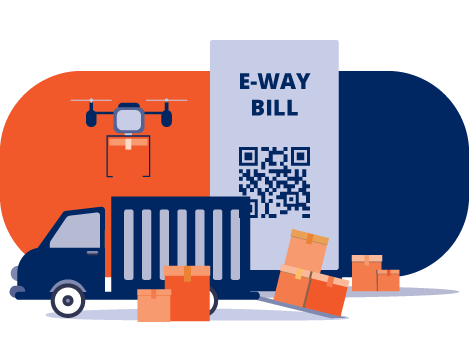
Documents Required
Supply of Goods
Transport ID
Transport Document
Accountant & GST Software
The e-way bill is a digital document required for the interstate movement of goods in India, serving as a mechanism to track and ensure the seamless transportation of consignments.
E-Way Bill
In the complex web of logistics and trade, the e-way bill has emerged as a crucial digital document, revolutionizing the movement of goods in India. This comprehensive guide aims to shed light on the e-way bill system, its significance, and how it streamlines the transportation of consignments, ensuring transparency and compliance.
I. Understanding the Basics
The e-way bill is a digital document introduced by the Government of India as part of the Goods and Services Tax (GST) regime. It serves as a mandatory electronic permit for the movement of goods valued at over INR 50,000 within the country, whether for intra-state or inter-state transportation.
II. Generating an e-Way Bill
1. Who Needs to Generate?
Any entity involved in the transportation of goods, be it the supplier, recipient, or the transporter, is required to generate an e-way bill. This inclusivity ensures that all stakeholders in the supply chain are accounted for, promoting transparency.
2. Information Required
To generate an e-way bill, certain key information is mandatory. This includes details such as the GST identification number of the parties involved, the invoice or bill of supply number, and the vehicle number carrying the goods. Providing accurate information is essential for the e-way bill to serve its intended purpose.
III. Significance of the e-Way Bill System
1. Preventing Tax Evasion
The e-way bill system acts as a deterrent to tax evasion by creating a digital trail of the movement of goods. This ensures that goods are accounted for, and appropriate taxes are paid, contributing to a more transparent and fair taxation system.
2. Efficient Monitoring of Goods Movement
By digitizing the documentation process, the e-way bill system allows for real-time monitoring of goods in transit. This not only enhances efficiency but also enables authorities to intervene promptly in case of discrepancies or suspicious activities.
What is an eway bill?
e-way bill is short for Electronic Way Bill. GST E-way bill is a document used to track goods in transit introduced under the Goods and Service Tax. A taxable person registered under GST involved in the transportation of goods with a value of over Rs.50,000 must possess an E-way bill generated on the GST Portal.
LEDGERS has made E-way bill generation and management very simple for business. The Ledgers E-way bill tool is synced to GST invoices, bills of supply, purchases invoices, and customer or supplier accounts.
eWay Bills can be generated seamlessly at the click of a button and shared with the customers or suppliers. The procedure for moving the movements of goods is prescribed in the E-way bill rules. However, it is to be noted that when the GST Act came into being on the 1st of July, the E-way bill implementation was deferred.
Documents required to generate eWay Bills
What documents are required to generate an E-way bill?
- Invoice/ Bill of supply/ Challan relevant to the consignment of goods
- In case of Transport by road- Transporter ID or the vehicle number
- Transport by rail, air, or ship- Transporter ID, Transport document number, and date.
What is the eWay bill format?
The E-way bill consists of two parts Part A and B. The Part A of the E-way bill collects the details related to consignment, usually the invoice details. Accordingly, the following information needs to be submitted.
- GSTIN of the recipient must be submitted.
- The Pin code of the place where goods are delivered needs to be mentioned.
- The invoice or the challan number against which the goods are supplied must be submitted.
- The value of consignment is to be mentioned.
- HSN code of the goods which are transported should be entered. If the turnover is up to INR 5 crores, the HSN code’s first two digits should be mentioned. If the turnover is more than INR 5 crores, a four-digit HSN code is required.
- The reason for transportation should be predefined, and the most appropriate one needs to be selected.
- The transport document number should be indicated. It includes goods receipt number, railway receipt number, airway bill number.
